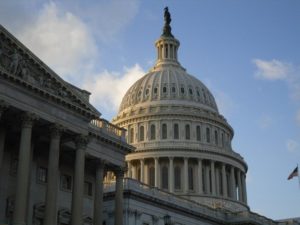
On January 6, 2021, thousands of people attended President Trump’s Save America rally in Washington D.C. to support his assertions that the 2020 Election was rigged and stolen. Afterwards, many of his supporters marched down Pennsylvania Avenue to the Capitol building where a joint session of Congress was convened to certify the Electoral College vote. Several members in the crowd breached the barricades surrounding the building and entered in an attempt to prevent both houses from approving Joe Biden’s victory. The ensuring riot lasted for several hours while people occupied, vandalized and stole from the building. Eventually, the building was evacuated and locked down, but not before thousands of dollars in damage and five deaths occurred. Despite this attempt to disrupt the electoral process, Congress resumed session later that evening and certified the election for Joe Biden.
In the aftermath, the U.S. Attorney’s Office and the FBI began to identify and execute arrests for hundreds of people who were involved in the riots and committed criminal actions. Many perpetrators revealed their own identities by posting pictures of themselves on social media engaged in criminal activities. Among those was Derrick Evans, an elected official in the West Virginia House of Delegates, who took a video of himself entering the Capitol. His now-deleted video he had uploaded to the internet depicted him yelling “We’re in! We’re in! Derrick Evans is in the Capitol”. He was arrested on January 8, 2021 and charged with, among other offenses, knowingly entering or remaining in any restricted building or grounds without lawful authority, contrary to 18 U.S.C. §1752. Mr. Evans resigned from the West Virginia House of Delegates the next day on January 9, 2021.
18 U.S. Code § 1752 defines “restricted buildings or grounds” as “any posted, cordoned off, or otherwise restricted area”—
- “[O]f the White House or its grounds, or the Vice President’s official residence or its grounds.” 18 U.S.C. 1752(c)(1)(A).
- “[O]f a building or grounds where the President or other person protected by the Secret Service is or will be temporarily visiting.” 18 U.S.C. §1752(c)(1)(B).
- “[O]f a building or grounds so restricted in conjunction with an event designated as a special event of national significance.” 18 U.S.C. §1752(c)(1)(C).
As applied to the U.S. Capitol building on January 6, 2021, federal prosecutors can make a very convincing argument to the court that the joint session of Congress to certify the Electoral College votes for the next President of the United States would qualify as “a special event of national significance.”
Furthermore, whoever:
- [K]knowingly enters or remains in any restricted building or grounds without lawful authority to do so.” 18 U.S.C. §1752(a)(1).
- “[K]nowingly, and with intent to impede or disrupt the orderly conduct of Government business or official functions, engages in disorderly or disruptive conduct in, or within such proximity to, any restricted building or grounds when, or so that, such conduct, in fact, impedes or disrupts the orderly conduct of Government business or official functions.” 18 U.S.C. §1752(a)(2).
- “[K]nowingly, and with the intent to impede or disrupt the orderly conduct of Government business or official functions, obstructs or impedes ingress or egress to or from any restricted building or grounds.” 18 U.S.C. §1752(a)(3).
- “[K]nowingly engages in any act of physical violence against any person or property in any restricted building or grounds.” 18 U.S.C. §1752(a)(4).
- “[K]nowingly and willfully operates an unmanned aircraft system with the intent to knowingly and willfully direct or otherwise cause such unmanned aircraft system to enter or operate within or above a restricted building or grounds.” 18 U.S.C. §1752(a)(5).
Or attempts or conspires to do ANY of the foregoing is guilty of a crime.
The penalties for entering or remaining on or in a restricted building or grounds are as follows:
- A misdemeanor conviction punishable by a fine or up to one year imprisonment, or both. 18 U.S.C. §1752(b)(2).
- A felony conviction punishable by a fine or up to ten years imprisonment, or both, if EITHER of the following apply:
-
- “[T]he person, during and in relation to the offense, uses or carries a deadly or dangerous weapon or firearm.” 18 U.S.C. §1752(b)(1)(A).
- “[T]he offense results in significant bodily injury.” 18 U.S.C. §1752(b)(1)(B).
The basis underlying legal theory of 18 U.S.C. §1752 is to prohibit trespassing. The government has the right to control the presence of the general public on its property. Arguments that federal buildings belong to the “taxpayers” and they can come and go as they please will not work as a suitable defense. The government has the right to establish reasonable regulations for members of the public being on the grounds, even important buildings such as the U.S. Capitol and the White House.
Very likely, the rioters charged with entering or remaining in or on a restricted building or grounds will attack the charge on the basis that their First Amendment right to protest the government. However, the U.S. Supreme Court has consistently held that governments can impose reasonable time, place and manner restrictions on constitutionally protected activity. For example, protestors are free to congregate outside of the Capitol building and engage in peaceful and orderly demonstrations, provided that they are not disrupting governmental activity. It is unlikely that the rioters will defeat the charges on this basis.
Derrick Evans and all of the other accused rioters charged are entitled to be presumed innocent until proven guilty. They are also entitled to have a skilled criminal defense lawyer in their corner to aggressively protect their rights, assert every defense available, and hold the prosecutor to the legal standard of proving guilt beyond a reasonable doubt. If you or a loved one is charged with any crime and need legal representation, then do not hesitate to contact the experienced attorneys at Kershaw, Vititoe & Jedinak PLC for assistance today.





